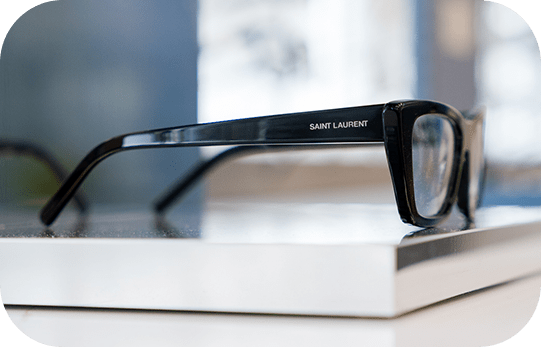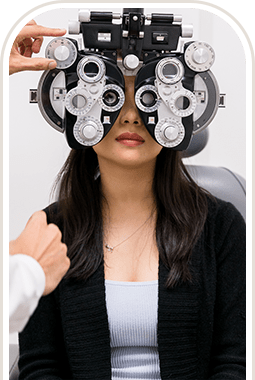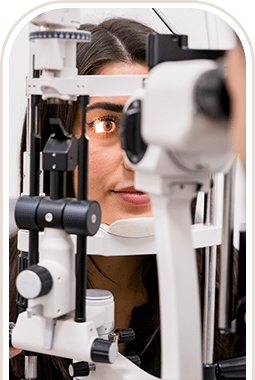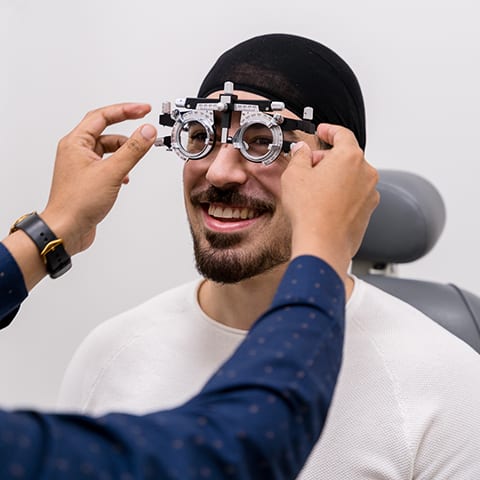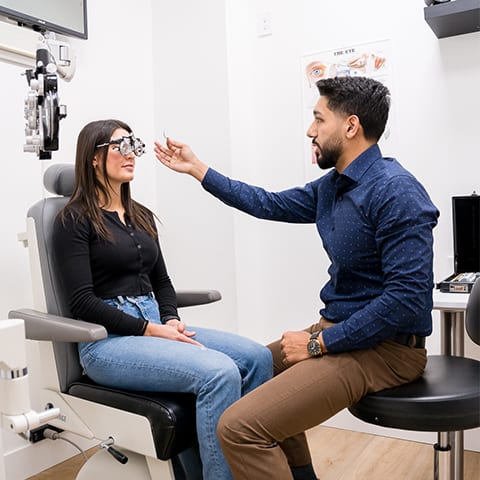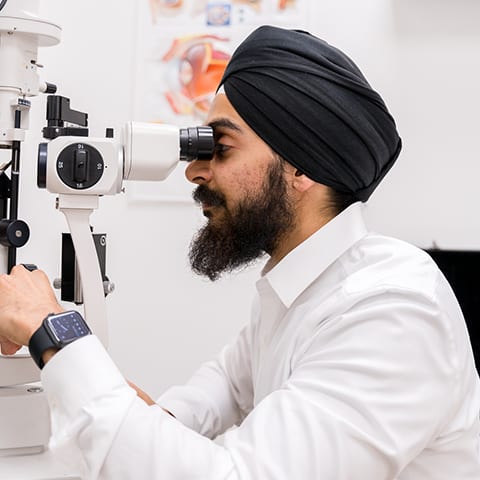Your Eye Health Comes First
Eye diseases can be challenging to manage and can appear in different forms. Your eye exam with us is about more than just updating your prescription—it also allows our team to check for early signs of subtle eye diseases.
The diagnostic technology and techniques we use during our eye exams include visual field testing and retinal imaging. These tests help us get a complete picture of your eye health so we can diagnose and manage eye diseases such as cataracts, diabetic eye disease, and age-related macular degeneration (AMD).
We take a hands-on approach to detecting, monitoring, and managing eye disease, and we work closely with many ophthalmologists to provide timely referrals. Contact us to schedule your appointment today.
Book Appointment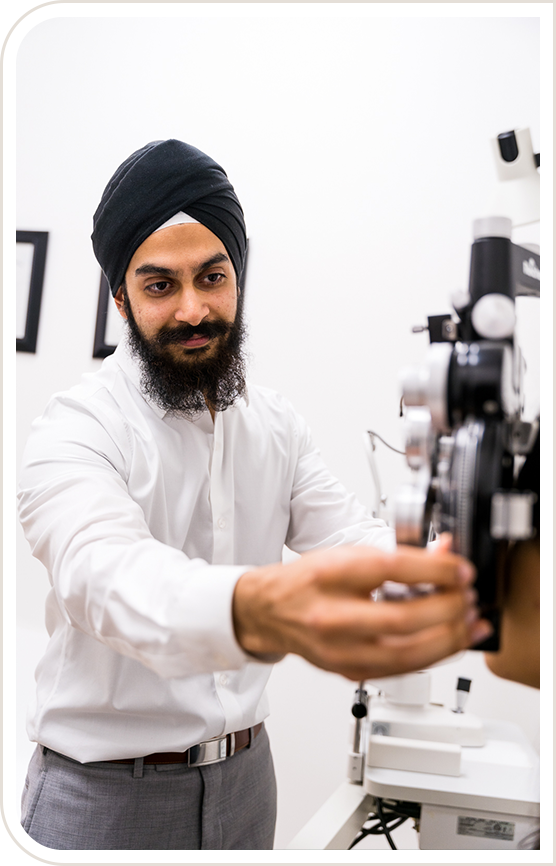
The Importance of Early Detection
The earlier we detect signs of eye diseases, the sooner our team can begin preparing a personalized treatment plan to preserve your vision.
Retinal imaging and visual field testing allow us to pick up on subtle abnormalities and signs of potential issues that could go unnoticed without testing.
When regular eye exams help our team detect possible issues early, we can get a head start on helping you manage serious conditions.
Our Diagnostic Technology
To assist us in the early detection of eye diseases, we implement a suite of modern diagnostic technologies that help us get a clear, complete picture of your eyes and vision. Our technology plays a big role in our ability to help our patients enjoy clear, healthy vision.
Our clinic offers retinal imaging, fundus photography, and visual field testing, and we enjoy exploring new options for optometric care that help us provide more personalized experiences.
Retinal Imaging
Retinal imaging is a noninvasive and safe method that helps our team closely examine your eye’s health and monitor changes over time. It allows our doctors to capture digital pictures of the back of your eye, including the retina and optic disc.
This procedure provides a detailed view that can help detect early signs of various health conditions, such as glaucoma, diabetes, and macular degeneration.
Fundus Photography
Fundus cameras are commonly used for retinal imaging. These specialized cameras capture high-resolution images of the retina, allowing for a thorough examination of optic tissues and blood vessels.
With the unobstructed view provided by fundus photography, our doctors can assess your eye health accurately and identify any abnormalities or potential issues.
Visual Field Testing
Visual field testing measures your peripheral vision, helping us identify any defects or loss of vision in your side or central field of view. It plays a crucial role in diagnosing and monitoring conditions like glaucoma that can cause peripheral vision loss.
With consistent visual field testing, we can track changes in your vision and adjust your treatment plan accordingly.
The Different Forms of Eye Disease
What can make eye diseases so challenging to manage is the different forms they can come in. A big goal of our doctors at Eyestyle Eyecare is to help our patients understand the different forms of eye disease and some of their early symptoms.
Dr. Minhas and Dr. Dhesa are always more than happy to go more in-depth with you about specific eye diseases when you visit us for a comprehensive eye exam.
Glaucoma
Glaucoma is a group of eye conditions that cause damage to the optic nerve, which is responsible for sending visual information to your brain. Damage to the optic nerve can lead to vision loss and blindness if not detected and treated early.
Damage from glaucoma can be caused by high pressure in the eye, referred to as intraocular pressure. Age, family medical history, and previous eye injuries can all be contributing risk factors for glaucoma.
While there is no cure for glaucoma, there are medications and surgeries available that can help prevent further vision loss. Early detection and regular eye exams are vital to slowing the progress of this disease.
Cataracts
Cataracts develop when the normally clear lens in your eye becomes clouded. The cloudy nature of cataracts can vary from small areas to larger areas that cause a noticeable loss of vision.
Symptoms of cataracts can include:
- Blurry vision
- Decreased night vision
- Muted colours
If cataracts progress to an advanced stage and prevent you from going about your daily activities, such as reading or driving, cataract surgery can be an effective way to remove them and restore your vision.
Age-Related Macular Degeneration (AMD)
Age-related macular degeneration is a progressive disease that affects your central vision by damaging the macula, the central part of the retina. This damage can make activities like reading and driving more difficult. AMD is a leading cause of vision loss among older adults, and there are 2 main types:
- Dry AMD is the more common form of the disease and occurs in early, intermediate, and late stages. This form of AMD occurs when the macula thins with age.
- Wet AMD is the less common form of the disease that can cause faster and more severe vision loss. Wet AMD occurs when abnormal blood vessels grow in the back of the eye and damage the macula. This form of AMD is considered an eye emergency.
Diabetic Eye Disease
As many as 1 million Canadians are estimated to be living with undiagnosed diabetes. Diabetes can increase your risk of developing eye diseases such as cataracts and diabetic retinopathy, which is a primary vision loss concern for patients with diabetes.
Diabetic retinopathy is a condition that causes damage to the blood vessels of the retina. This damage is caused by a buildup of excess sugar in your blood, which can lead to a number of health issues.
Symptoms of diabetic retinopathy can include:
- Blurry vision
- Black spots or holes in your vision
- A loss of central vision
Consistent eye exams can lead to the early detection of diabetes, reduce the risk of vision loss, and even help detect conditions like heart disease and kidney failure.
Prioritizing Your Long-Term Eye Health
We aim to preserve your long-term eye health with our eye disease diagnosis and management services. Our team knows that managing and experiencing eye diseases can be stressful, but we’re in your corner to help.
Contact us to schedule your appointment and start addressing early signs of eye diseases today.
Book AppointmentCome Visit Us
South Surrey
You can find us at 3211 152 Street, with plenty of parking in front of the building. We are located beside the Tap and Barrel.
We look forward to welcoming you and your family to our practice!
- 3211 152 Street #109
- Surrey, British Columbia V3S 3M1
- Phone: 604-370-2425
- Fax: 604-370-2434
- Email: [email protected]
Hours
- Monday: 10:00 AM – 6:00 PM
- Tuesday: 10:00 AM – 6:00 PM
- Wednesday: 10:00 AM – 6:00 PM
- Thursday: 10:00 AM – 6:00 PM
- Friday: 10:00 AM – 6:00 PM
- Saturday: 10:00 AM – 6:00 PM
- Sunday: 11:00 AM – 4:00 PM
*We offer emergency eye care services, so don’t hesitate to visit us if you need assistance.
Kelowna
We’re excited to announce our new office located in The Block Office Tower between Gallery Streetwear and Lavender & Grace Jewelry. Our team will continue offering the same quality eyewear and personalized service you’ve come to expect.
We look forward to welcoming you to our clinic!
- 582 Bernard Ave
- Kelowna, British Columbia V1Y 6P2
- Phone: 604-260-6080
- Fax: 604-260-6079
- Email: [email protected]
Hours
- Monday: Closed
- Tuesday: 10:00 AM – 6:00 PM
- Wednesday: 10:00 AM – 6:00 PM
- Thursday: 10:00 AM – 6:00 PM
- Friday: 10:00 AM – 6:00 PM
- Saturday: 10:00 AM – 6:00 PM
- Sunday: Closed
Our Brands


